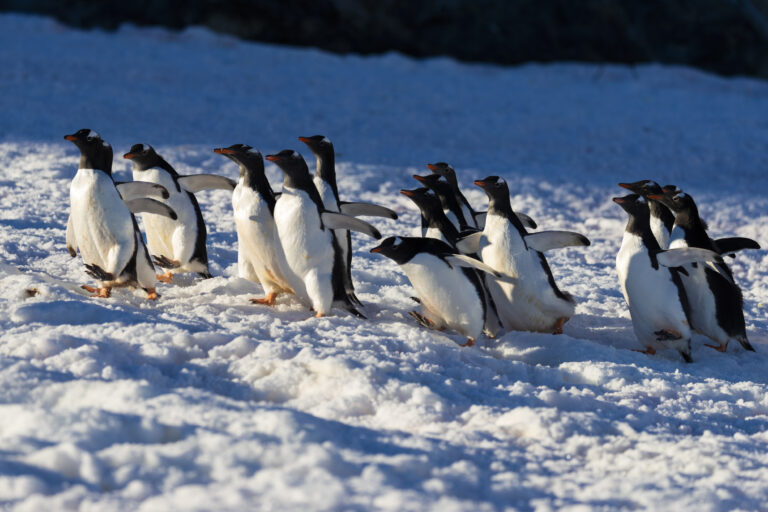A group of Antarctic penguins is set to become the unlikely face of international dissent following a new United States trade policy that targets remote, uninhabited islands.
The birds won’t be picketing outside the White House, but conservationists plan to frame their annual migration as a “protest march” against tariffs imposed by President Donald Trump.
The lighthearted campaign is a response to real economic policy: a 10 percent tariff on the Australian territories of Heard Island and the McDonald Islands, which are home only to seals, seabirds and penguins.
While the islands have no permanent residents or exports to speak of, they were still included in Trump’s sweeping new trade agenda, which has drawn confusion from reporters and condemnation from world leaders.
Why Did Trump Place Tariffs on Heard Island and the McDonald Islands?
The tariffs are part of a broader economic plan Trump unveiled on what he dubbed “Liberation Day.” The plan includes a blanket 10 percent duty on all imports and increased rates for certain nations.
Trump said the policy is intended to address a $1.2 trillion trade deficit and put American interests first. “Taxpayers have been ripped off for more than 50 years. But it is not going to happen anymore,” Trump said.

Ric Tapia/AP
The White House justified the tariff by alleging that the islands impose a 10 percent “tariff to the USA,” citing “currency manipulation and trade barriers.” In retaliation, the United States has implemented “discounted reciprocal tariffs” at the same rate (Newsweek).
But the inclusion of these uninhabited volcanic outposts raised eyebrows. According to World Bank data, the U.S. imported $1.4 million worth of goods from the islands in 2022—mostly machinery and electrical products, despite there being no local infrastructure. The islands have reportedly not been visited by humans in nearly 10 years.
Australian Prime Minister Anthony Albanese was among the critics. “Nowhere on Earth is safe,” he said.
In a post on X, formerly Twitter, he added: “These tariffs are not unexpected, but they are unwarranted. Many other countries will be hit harder by today’s decision than Australia—and no nation is better prepared than Australia.”
When Is the Penguins ‘Protest’?
In response to the unexpected focus on penguin territory, the conservation group Penguins International is using the moment to draw attention to climate and biodiversity issues.
The organization announced it will livestream the annual migration of Antarctic penguins on April 16, branding the event the “Protest March of the Penguins.” The broadcast on the nonprofit’s YouTube channel will begin at 5 p.m. EST.
“Wild penguins, like those that inhabit the Heard and McDonald Islands, face threats that are far more real than the tariffs that were imposed,” David Shutt, the non-profit’s executive director, told Indy100.
“Today, nine of the 18 species of penguins that exist are either listed as vulnerable or endangered of becoming extinct. We’re grateful to be able to use the unexpected attention on the Antarctic penguins to shine a light on the species as a whole, and to turn this news story into an opportunity to protect them for the greater good of the planet.”
The campaign has taken off online under hashtags like #PenguinsAgainstTrump, spawning memes, mock press conferences and parody protest signs. Penguins International said it also hopes to organize a real protest event on April 25—World Penguin Day—to further highlight environmental threats facing seabird species.
During an interview on CNN’s State of the Union, Agriculture Secretary Brooke Rollins was challenged by host Jake Tapper over the decision to levy tariffs on islands populated only by wildlife.
“You’re imposing a 10 percent tariff on the Heard and McDonald Islands. The Heard and McDonald Islands have zero human inhabitants. They had zero exports. They had zero imports. They do have a lot of penguins. Why are you putting import tariffs on islands that are entirely populated by penguins?” Tapper asked.
Rollins laughed and responded: “Well, I mean that—come on Jake. Obviously… here’s the bottom line. We live under a tariff regime from other countries. We have too long ceded the idea that America goes first. I mean, come on, whatever.”
While the Trump administration continues to tout the tariffs as a bold economic reassertion, the policy’s unintended consequence may be raising global awareness of penguin conservation.
“We’re grateful to be able to use the unexpected attention on the Antarctic penguins to shine a light on the species as a whole, and to turn this news story into an opportunity to protect them for the greater good of the planet,” Shutt told Indy100.


